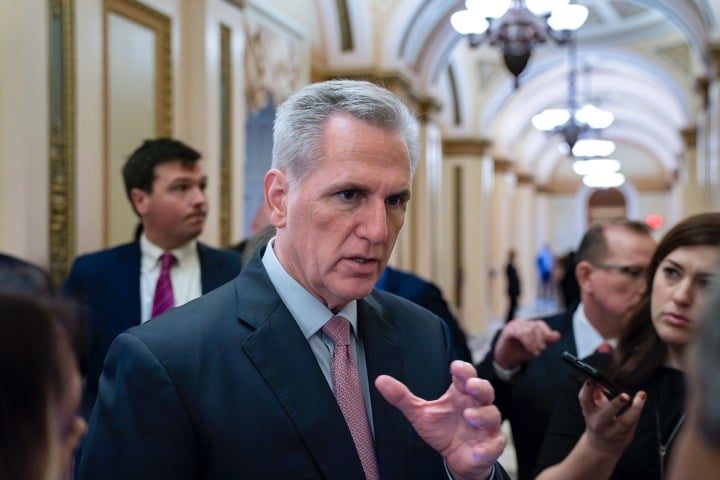
On Wednesday, the U.S. House of Representatives passed the “Limit, Save, Grow Act of 2023” (H.R. 2811) to raise the government’s $31.4 trillion debt ceiling and avert a potential default that could cripple the nation’s economy and unsettle financial markets worldwide.
“The Limit, Save, Grow Act is a commonsense approach to return to fiscal sanity by putting an end to Democrats’ trillion-dollar spending sprees while ensuring Veterans, Medicare, and Social Security programs are strengthened and preserved. It will save taxpayers trillions of dollars by reclaiming unused Covid funds, stopping Biden’s student loan giveaway to the wealthy, and defunding his army of IRS agents. At the same time, it will promote a strengthened workforce to help lift more people out of poverty,” stated House Speaker Kevin McCarthy (R-Calif.) after securing the bill’s narrow passage of 217-215.
The bill was a solid victory for McCarthy, as he managed to pull together a divided House, finding enough support to give the Senate and President Biden an opportunity to see a Republican budget plan that included raising the debt ceiling. Biden submitted his budget plan early last month, stating, “I just laid out the bulk of my budget. Republicans in Congress should do the same thing. Then we can sit down and see where we disagree,” reported ABC News.
But less than a day after the Republicans submitted their plan to increase the federal debt limit, Biden’s offer to sit down is being revoked. During Thursday’s press briefing, White House Press Secretary Karine Jean-Pierre said, “The United States have never — has never in our history failed to pay our debts…. We’re not a deadbeat nation. Avoiding default is Congress’s responsibility. And they should act in — on it without preconditions…. As the President said yesterday, he’s happy to meet with Speaker McCarthy but not on whether or not the debt limit gets extended…. We are not negotiating on this.”
Apparently, Biden is willing to push the nation into default without even a discussion over the Republicans’ plan, which buys time with the bill’s suspension of the debt limit through March 31, 2024, or until the debt increases by $1.5 trillion. The cuts being proposed in the House budget plan are small and should be quite agreeable to Biden if he would just sit down and negotiate.
According to the Congressional Budget Office (CBO), the Republican plan limits discretionary funding over the next 10 years. That alone would reduce projected budget deficits by about $4.8 trillion over the 2023–2033 period. The CBO noted that reductions in discretionary spending would amount to $3.2 trillion. Mandatory spending would decrease by $0.7 trillion, and interest paid on the public debt would be reduced by $547 billion over 10 years.
These paltry cuts to the existing $31.5 trillion budget debt should at the very least bring an end to what looks to be nothing more than political stunts.
The Epoch Times shared:
When asked why the president was waiting, Jean-Pierre said, “They have put together an agenda—extreme MAGA. We cannot allow this to happen. I don’t have anything new to say.”
Making only commonsense cuts to Biden’s vast social and environmental justice programs, the Republican plan can hardly be viewed as “extreme MAGA.”
Even Democrats are getting frustrated with Biden’s political rhetoric. Senator Joe Manchin (D-W.Va.) said in statement on the debt limit proposal:
America is facing a historic economic crisis brought on by an abject failure to address our exploding national debt, chronic inflation, a looming recession, and the more immediate need to raise the debt ceiling. Our elected leaders must stop with the political games, work together and negotiate a compromise. Instead, it has been more than 78 days since President Biden last met with Speaker McCarthy. This signals a deficiency of leadership, and it must change. The fact is we are long past time for our elected leaders to sit down and discuss how to solve this impending debt ceiling crisis.
The clock is ticking, as the Treasury’s “extraordinary measures” implemented in January to continue paying the nation’s bills while Congress worked on a way to raise the debt ceiling will reach their limit before summer is out.
Although Republicans have placed a reasonable budget plan into the hands of Democrats and the president to get through the immediate debt crisis, the only long-term solution is to cut all unconstitutional spending and limit the federal government to its proper function.




